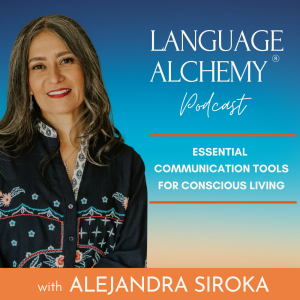
Wednesday Feb 21, 2024
136. Apologize Like an Adult
Do your apologies sound like a monologue? If you find yourself stuck in the cycle of the "typical apology," chances are your apologies aren’t creating a dialogue, repairing damaged connections or getting the results you desire. In this eye-opening episode, Alejandra Siroka unveils the hidden influence of childhood apologies on our adult communication styles. Drawing from personal anecdotes and insightful analysis, she shines a light on how these early lessons shape our approach to reconciliation.
By exploring typical apologies in real-life scenarios, Alejandra exposes the limitations of traditional approaches in fostering genuine connection. From deflecting blame to downplaying our impact, she navigates through the common pitfalls that hinder authentic reconciliation and mutual understanding.
Advocating for a shift towards conscious apologies, Alejandra emphasizes the importance of accountability and vulnerability in fostering a deeper experience of connection. Through practical guidance and heartfelt insights, she empowers listeners to embrace sincere communication and take ownership of their words and actions.
Alejandra promises to lead listeners on a journey towards exploring the art of conscious apologies in the next episode. Encouraging introspection and reflection, she invites listeners to explore how they can communicate with responsibility and authenticity.
To further support listeners, Alejandra extends an invitation to email her with the subject line "APOLOGY ACCOUNTABILITY" for personalized accountability support.
Tune in to discover the keys to apologizing with sincerity and accountability, paving the way for deeper connections and meaningful reconciliation.
Quotes
• “What is a typical apology? Let's break it down. First, you say, I'm sorry. Then, you launch into an explanation about the reasons that led you to your unskillful words, reactions, and behaviors, and you start to feel good about this. After that, you elaborate some more to let the other person, the recipient of your unskillful communication, see that you had a good intention or that you are a good person who made a tiny, completely forgivable mistake. You also feel good about this. After all that, you ask for forgiveness, just to check that the relationship can go back on track. And finally, you end the apology, either thanking the other person for their forgiveness, or you try to make things better with a childlike tone of voice and offer some kind of reward or do something sweet and affectionate. If the person who was negatively impacted tells you they do forgive you, you feel great relief and you consider the matters closed.” (8:22 | Alejandra Siroka)
• “When you communicate a typical apology, you're not taking responsibility for your communication or your behavior because you're simply explaining why you did what you did.” (10:07 | Alejandra Siroka)
• “When you punish the one who is feeling hurt, angry, disappointed, or negatively impacted, or when you punish yourself for not being forgiven, you are generating more pain.” (12:20 | Alejandra Siroka)
• “Connection needs dialogue. It needs two people who are sharing and listening. With a typical apology, the person who was negatively impacted was not given any space to be heard.” (12:53 | Alejandra Siroka)
Links
To have group coaching with Alejandra, visit:
https://www.languagealchemy.com/groupcoaching
To work with Alejandra, visit: www.languagealchemy.com/workwithme
To join the Language Alchemy mailing list, visit: https://www.languagealchemy.com
To ask questions you'd like Alejandra to answer in the podcast, visit: https://www.languagealchemy.com/podcastquestion
To find out about 1:1 transformative communication coaching with Alejandra, visit: https://www.languagealchemy.com/oneonone
To find out about couple transformative communication coaching with Alejandra, visit: https://www.languagealchemy.com/couples
To schedule a reduced-rate coaching consultation with Alejandra, visit: https://www.languagealchemy.com/newclient
To follow Alejandra on instagram follow @languagealchemy
Podcast Music composed by Gary Lapow: open.spotify.com/artist/1HlMhcNfKIELxYil5mVqD
No comments yet. Be the first to say something!